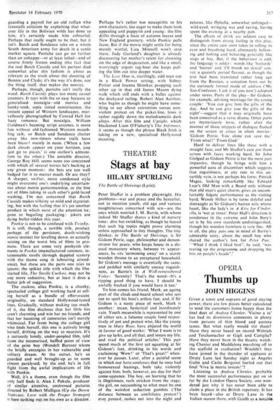THEATRE
Stags at bay
HILARY SPURLING
The Battle of Shrivings (Lyric).
Peter Shaffer is a problem playwright. His problems—war and peace and the hereafter, not to mention youth, old age and various naughtinesses concerned with sex—are the ones which worried J. M. Barrie, with whom indeed Mr Shaffer shares a kind of nursery tone: dire but twinkling, as though he feared that such big topics might prove alarming unless approached in tiny thoughts. The tiny thinker, in The Battle of Shrivings, is Sir Gideon Petrie, sage, philosopher and demon- strator for peace, who keeps house in a dis- used monastery where, between TV appear- ances, he sits `sermoning away' on a sturdy wooden throne to an enraptured household. Sir Gideon's message is essentially the same, and peddled with similarly uneasy roguish- ness, as Barrie's in A Well-remembered Voice: 'Serenity! That's the word—It's a ripping good thing to have. I should be awfully bucked if you would have it too.'
To him comes his friend, Mark, an ageing poet of the cloak-and-beard school who sets out to spoil his host's artless fun; and, if Sir Gideon is a nasty piece of work, Mark is another: mean, hysterical and inordinately vain. Youth meanwhile is represented by one of either sex, a fulsome couple fond respec- tively of pot and protest who, like the young man in Mary Rose, have abjured the world in favour of good works: 'What I want is to give up larks, and all that, and insure my life, and read the political articles.' This pair spend much of the first act squatting at Sir Gideon's feet, drinking in his words and exclaiming `Wow!' or 'That's great!' when- ever he pauses. Later, after a painful scene in which our hero confesses that he once had homosexual leanings, both take violently against him; both, however, are due for their come-uppance. The boy, on learning that he is illegitimate, reels stricken from the stage; the girl, on succumbing to what must be one of the weirdest seduction gambits (The distance between us annihilates protest!') ever penned, rusheS out into the night and returns, like Ophelia, somewhat unhinged— wild-eyed, wringing wet and raving, having spent the evening at a nearby pub.
The effects of drink are seldom easy to distinguish from strong feeling in this play, since the entire cast soon takes to rolling its eyes and breathing hard, alternately bellow- ing and bolting and behaving generally like stags at bay. But, if the behaviour is odd,
the language is odder: words like 'bastardy' and 'barren' and 'I'll brook no denial' con- vey a quaintly period flavour, as though the text had been translated rather long ago from the Russian, a sensation born out by the curiously formal mode of address ('My Son-Confessor, I ask it of you now') adopted under stress.- Parts of the play—Sir Gideon, for example, advising marriage for the young couple: 'You can give him the gifts of the day. And he can give you the gifts of the night'—suggest that it may originally have been conceived as a verse drama. Other parts are mysteriously terse, rather after the manner of those snippets of dialogue flashed on the screen at crises in silent movies: `Gideon Petrie. You alone can save me.' `From what?' From God.'
Hard to deliver lines like these with a straight face, and Mr Shaffer's cast put them across with faces working hard. Sir John Gielgud as Gideon Petrie is for the most part impassive, though he brings with him a powerful aura of discomfort which suggests that roguishness, at any rate in this un- earthly vein, is not perhaps his forte; Patrick Magee, looking remarkably like Edward Lear's Old Man with a Beard only without that old man's quiet charm, gives an uncom- fortably fidgety performance as the visiting bard; Wendy Hillier is by turns doleful and distraught as Sir Gideon's barren wife whose heart, like the lady's in A Kiss for Cinder- ella, is 'wet at times'. Peter Hall's direction is ponderous in the extreme and John Bury's set is by his own standards undistinguished, though his wooden furniture is very fine. All in all, the play puts one in mind of Barrie's admirable story, about the small boy who shared the author's box for Peter Pan: "What I think I liked best", he said, "was tearing up the programme and dropping the bits on people's heads".'


































 Previous page
Previous page